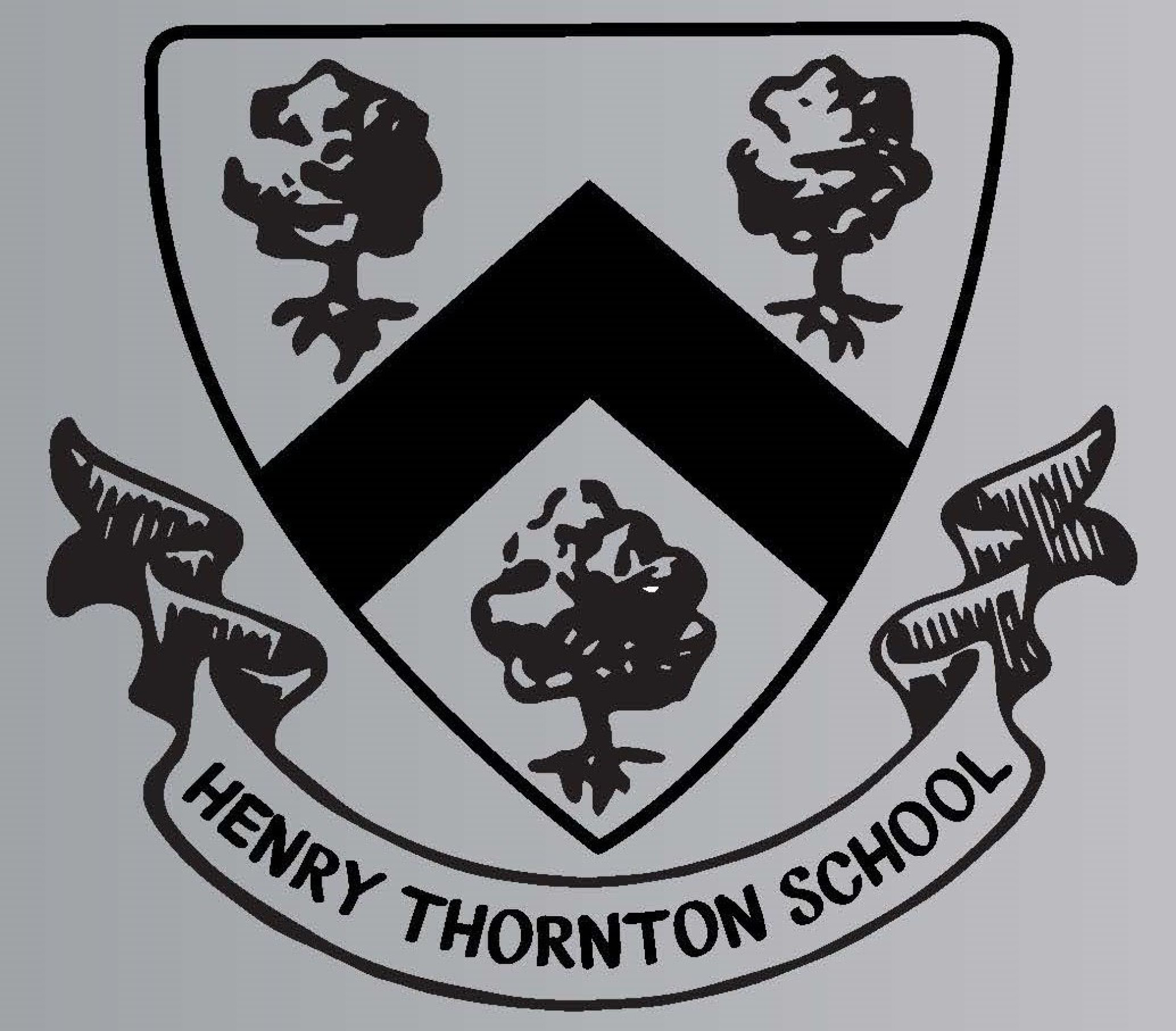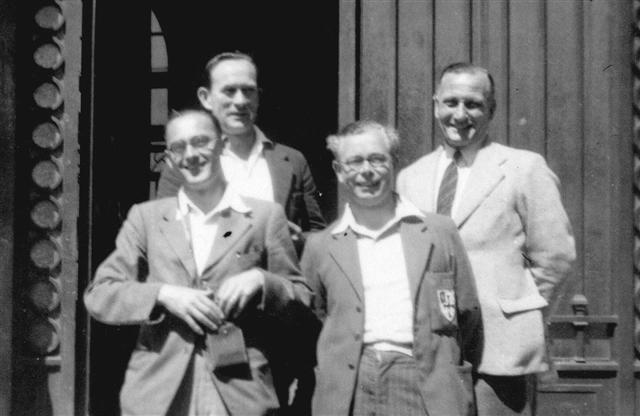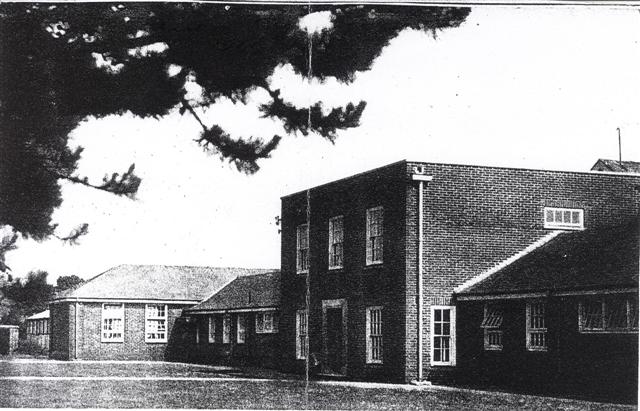
Old Thorntonians Association (CLAPHAM)
Henry Thornton School, Clapham, South London


Old Thorntonians Association (CLAPHAM)
Henry Thornton School, Clapham, South London

Pupils were evacuated to Chichester from October 1939 until July 1943. (The names of those OTs still traceable and known to have spent at least part of their school years there are given at the end of this section.) The initial relocation, in September, was to Bognor Regis and the immediate surrounding area ("a blunder, as there were no grammar schools in that town" - Donald Bishop, 1934-41). They were boarded out with local families and attended Chichester High School for Boys (CHSB).
The HTS teaching staff at CHSB included:
WD Evans - Head Master
RS Bramble - Physical Education
AH Collins - English
WJ Cooper - Latin
LB Cundall - Geography
GW Dix - Art
CW Gribble - French
F Haill - French, Games [See also CHALOBS reference at end of this page]
CE Jeremy - History
SW Read - Chemistry.
Frank Haill and Mike Collins remained at the High School after the war, having accepted posts there.
The picture below, taken in 1953, shows the CHSB teaching staff, including the two ex-HTS masters who stayed on after the wartime evacuation period: AH (Mike) Collins, far-right in the back row, and Frank Haill, sixth from the right in the same row.

A few reminiscences...
Donald Bishop: "The HTS buildings in London had warm enclosed corridors. CHS classrooms opened on to fresh air. In the winter our staff wore overcoats! HTS 6th Form included the teaching of Economics, Economic History and British Constitution to Higher Schools level. These subjects were not on offer from CHS, so there could be no joint classes. Pupils from both schools made friendships in youth clubs, sport, and so on."
From Eric Jennings (1936-41): "I recall being billeted with 9 other boys in a bungalow on [Pagham] beach for several weeks or months before transferring to Chichester. I will always remember that bungalow - it was formed by two full-length railway coaches as the sides, with the space between built over with a peaked roof. The main centre of the structure was the living room and dining room. The railway coaches were divided into bedrooms. That was quite an experience - 10 boys at the beach!"
Don Appelbe, who started at Clapham in 1938 and was at CHSB from 1939 until 1943, recalls: "From 30 August to 1 September [1939] we mustered every morning on Clapham Common in expectation of imminent evacuation. We came prepared every day with rucksacks containing toilet gear, pyjamas, etc, and of course our gas masks! Whereas in prewar school in Clapham we had forms A, B and C in each year, at Chichester we had only one form per year. This was partly due to not everyone from HTS being evacuated and also to the return to London by many pupils during the September term. I also remember that [at Clapham] we had a 'Tuck Shop' during the mid-morning break where (if we were solvent) we could buy drinks, sweets and lovely cream buns. The 'Tuck Shop' was set up on a trestle table in front of the main entrance to the school."
The following article, penned by Mr W J Cooper, appeared in the Autumn Term 1943 issue of The Thorntonian.
In eager expectation we watched the stations pass. Bognor! Some had happy memories of the place in peacetime, and some did indeed for a while remain there. Others went to villages, others again to bungalow towns. After a few days, contact was regained between the various sections. The weather was lovely, the war far away, the bathing for most of us was near at hand, unlimited and most enjoyable: in fact, the only fly in the ointment was that the Headmaster believed, as we thought misguidedly, that the purpose of a school was education rather than recreation. His enquiries discovered that the nearest secondary school was six miles away at Chichester, and so, after an interval of eight weeks, the School was gradually transferred to a town already crowded with London children, and already feeling the first glow of reception enthusiasm abating. However, the local billeting authorities, with whom we always had most pleasant relations, did their best, aided by the efforts of all the Staff, and the boys were resettled in Chichester. Every part of the local Boys' High School was used, and from that time the School maintained an education that equalled peace-time standards and later, with smaller classes, probably excelled it. Billeting troubles were endless, and the great return began. However, the majority of the boys were happily placed and enjoying new scenes and a new life.
The Battle of Britain was seen from grandstand seats. Alerts drove us often to shelters even in the midst of Matriculation examinations, but most of us contrived to have glimpses of the air combats out of school hours, and many a boy rushed off on his bicycle to see the latest fallen aeroplane.
School numbers were now smaller, and there grew up intimacy between boys and masters, so far unparalleled. We grew to know one another well, and mostly to like one another better. Moreover, we now knew Chichester, and the townspeople, in turn, grew to welcome boys and Staff, many of the latter taking the lead in the Home Guard and Civil Defence and in local societies. Many of the older boys were in the Home Guard, and others helped their country by working on farms during the holidays. The School Garden provided much interest for many, and a small corps of devoted gardeners supplied all kinds of vegetables at cost price to Staff and boys for the benefit of the hostesses. Tomatoes proved a great success, and the boys, led by Mr Cooper, took second prize for points gained at the monthly shows of the Chichester Allotment Festival amid local acclamation. There were able later on to hand over a sum of £2 15s. to the Headmaster, this sum is a token payment for crops left behind on the School's return.
The annual Boxing Contests under Mr Bramble were staged before the local troops to the strains of a regimental band and the encouragement of the soldiers - another sign of our acceptance in the town. Later the local Boys' club was at our disposal.
Billeting, devotedly supervised by Mr Jeremy, now became more stabilised, the boys generally being quite settled; one indeed was adopted by his hostess and several obtained posts in the town. The School was a happy family, the boys now had two homes, and Staff and pupils were closely knit. The boys were grateful for the unceasing care of them by the Headmaster and his Staff. Classes were small and boys received a measure of individual attention they had never been able to have before. Matriculation results were very good. Of course, the lull in the raids made all of us feel we might be justified in a return to London, and eventually, the news came that the Headmaster was to return. The overwhelming majority of the boys decided to accompany him, and boys and Staff came back home from an experiment that had undoubtedly justified itself. Mistakes had been made, the human element had again proved incalculable, but though many hostesses had given of their best and kindliest to our boys, to some the task of adjustment had proved too difficult for host or guest. Those who had been able to stay on had benefited educationally, had widened their outlook, were better for the country air and had made many friendships. We, for our part, are grateful to those Cicestrians who showed us kindness, often ill-repaid financially we fear, and most of us have mixed memories of a great experiment. It is good to be home and to have high hopes that there will be no need for another exodus, and that soon victory and peace will be ours.
From The Martlet, magazine of Chichester High School for Boys, Summer Term 1943:
The end of evacuation comes to us this July. The Henry Thornton School returns officially to London, and we are asked to absorb some twenty boys of theirs or who have been attached to them from adjacent areas. Four years of sharing a School have, of necessity, taught us many lessons in patience and forbearance, but the difficulties of the period have been magnified by the steady growth of our own School. The rooms that our guests vacate will all be required in September to house the present forms and the two new ones that must be created for the School year 1943-44.
Meanwhile, let us bid farewell and godspeed to the Head Master and Masters of the Henry Thornton School. Our personal relations have been of the happiest, and we extend our sympathy to them in the retrospect of the disintegration in four years of a School of over 400 boys and the colossal problems that await them in re-opening their own buildings in London.
Copy of letter to the Editor of The Martlet:
Henry Thornton School
(at Chichester HS for Boys)
20th. July 1943
Dear Sir,
As this term brings to an end our stay in Chichester, I would like to thank, on behalf of the boys of the Henry Thornton School, all those members of the High School who have helped to make our stay here happy. It is with deep regret that we now find ourselves leaving the school to which, for four years, we have been so closely attached.
Throughout these years there has grown up, in addition to a great friendship, a great rivalry, which has shown itself in the numerous enthusiastic football and cricket games between the two schools.
And so, in conclusion, I will again thank Dr Bishop, his staff and his boys for all their assistance, and only wish that we could return their hospitality at our own school.
Yours truly
E.C.K. Wilson*
School Captain
*1935-43; killed in action on 8 December 1944 - his name appears on the WW2 memorial plaque


Group of CHSB masters in 1949
Roger Wardale, an Old Cicestrian, has identified the four as (back, L-R) Michael Colgan (PE) and Frank Haill (French, Sports),and (front) Eric Smedley and William Wake (both French). He believes the photograph was taken during the school's first post-war trip to France.
CHSB in 1949
OLD CICESTRIANS
CHSB has an active and well-established OB Society. Visit their website here.
OT EVACUEES
The following list of currently traceable OTs is based on information available to Ted Hayward from Association membership and other relevant records. Other names will be added where applicable, but in the meantime please advise him of any errors or omissions. The years shown are the full HTS attendance.
Geoff Ainsworth (1940-3); Don Appelbe (1938-43); Colin Bench-Capon (1942-7); Donald Bishop (1934-41); Michael Challons (1938-45); Monty Clarkson (1935-42); Charles Corcoran (1936-40); Les Garrett (1938-42); Peter Gash (1941-7); Ron Hercock (1935-40); Jimmy Hill OBE (1939-45); James Hiney (1941-4); Eric Hodge (1935-40); Eric Jennings (1936-41); Stan Joseph (1934-40); Peter Lawson (1936-41); Terry Sharp (1938-45); Harry Spence OBE (1940-4); Dave Taylor (1940-?); Donald Henry Turner (1939-44); Doug Ward (1938-45); Ray Wilkinson (1937-43).
Terry Sharp arranged an informal joint OT/OC meeting at the High School on 11 July 2008. The following OTs attended, with Terry: Don Appelbe, Les Garrett, Monty Clarkson and Doug Ward. The host was John Child, Deputy Head (since retired) of CHSB. A second "mini" reunion was held, again at Chichester, on 8 October 2009 (marking the 70th anniversary of the school's evacuation to West Sussex). Nine OTs attended; on this occasion, Richard Porter, one of the High School masters, welcomed the group, whose photograph appears below.

L-R: Geoff Ainsworth (1940-3); Peter Lawson (1936-41); Keith Weston (1936-43); Terry Sharp (1938-45); Monty Clarkson (1935-42); Doug Ward (1938-45); Harry Spence, OBE (1940-4); Les Garrett (1938-42); Don Appelbe (1938-43)
Also of interest is the following article which appeared in the Chichester Observer (the caption to this second photograph lists the correct names, apart from Keith Weston's, but randomly.)
